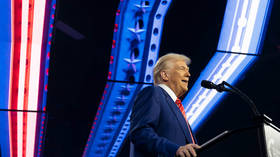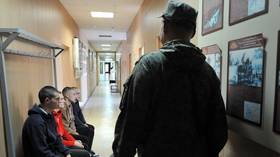Interview with Vyacheslav Zharko
Vyacheslav Zharko, a man who claims he worked for MI6 and who asked Russia's Security Service for protection because of his connection to Aleksandr Litvinenko, spoke to Russia Today.
This is an extended version of the interview posted on July, 5.
Russia Today: Thank you for your agreeing to talk to the Russia Today Company. How are you living now?
Vyacheslav Zharko: Fine.
RT: Is it a difficult period of your life?
V.Z.: It is not the first time, but everything is relative.
RT: You said earlier you collaborated with MI6, the British Secret Service. What specifically have you been doing for them? How did that happen?
V.Z.: Everything began in 2002. Aleksandr Litvinenko acquainted me with two officials from MI6, Secret Services as they called them. They suggested that I should provide them with some services on a compensatory basis. Aleksandr Litvinenko on the one side, and those two men on the other, started working mostly on issues of the economic and political situation in Russia and the CIS countries.
RT: You said they paid for your services. How much did it cost if it is not a secret and how did they pay you?
V.Z.: They paid me about 2,000 euros a month plus some expenses. They paid in cash in an envelope.
RT: In 2005, British agents tried to get some information from you concerning the FSB and operations concerning British spies here. I do not know whether it is true or not, the newspapers say so.
V.Z.: The newspapers are correct but you did not formulate your question correctly. You mean concerning political organisations? Is that what you mean?
RT: I read about the FSB and .
V.Z.: Yes, about the FSB, but you formulated your question incorrectly. The question about the FSB was a bit later. In 2005 there was an assignment to work on non-governmental organisations. We had to find out what other services beside the FSB, as there are some other special services, might show interest towards such non-governmental organisations, to find out how serious is their attention, and an evaluation had to be given, as those non-governmental organisations are connected to the intelligence.
RT: Did you provide them with such information?
V.Z.: You know, I made some analysis of the sources open to publishing, so I gave my analysis of it as I saw it.
RT: Did you have your own sources? In the FSB itself, probably, in those non-governmental organisations?
V.Z.: No, of course not, what are you talking about? Why? If I had any sources in the FSB, it would be a criminally liable act. I would not dare to do it. I always realised what I can do and what I mustn't. You can take information from open sources, and to have sources in the FSB as you say or somewhere else is espionage. I do not need it.
RT: How would you describe your activity?
V.Z.: As a consultant I would say, nothing more than a consultant. Of course they should have their own consultants but if they were satisfied with the information they got from me – it is their business. I got money from them. I was satisfied with it.
RT: Were they satisfied with it?
V.Z.: I think if I were in their shoes, this information would not suit me. But since some tasks of other kinds appeared – that I would begin recruiting operations against officials of the Counterintelligence Operations Department of the FSB of Russia, the very counterintelligence that are engaged in work on England – I think they received that information so they could use it after and press me and push me to work actively in that direction. This of course would be spying.
RT: If you allow me, I'd like to ask you a couple of questions about Mr Litvinenko. As far as I can understand, it was Mr Berezovsky who presented you two to each other, wasn't it?
V.Z.: That's right.
RT: What impression did Aleksandr Litvinenko produce on you?
V.Z.: You see, my attitude to him was ambivalent. On the one hand, it is enough to ask a person a couple of questions to see what level he is on. Litvinenko was someone who failed to find his own proper place in this life – it is my personal view – who wasn't quite bright intellectually. His reading background was quite poor. He wanted silly outward things. He used to say he had some tapes compromising certain persons. It was absolute nonsense. Like some additional information, databases, files, and cassettes compromising the President or the FSB director. You understand – either he was delirious or attempting to make cheap publicity for himself. But clever people will always understand it's not serious.
RT: One press publication quoted you as saying that Litvinenko had been preparing an attempt on Putin's life. For many it is even more difficult to believe this than what Litvinenko himself said.
V.Z.: Let me say it once again: Litvinenko was this kind of person. He was able to say just anything. He felt pathological hatred for this country. This is one more difference between him and me. Pathological hatred! If he said he'd form Chechen units, send them to Moscow and have everyone slain, what do you think it is? Or that he'd become FSB director, open all archives to MI6 and make me his deputy? I was laughing, of course, and tried to dismiss it as a fantasy, but it's a fact.
RT: How did you learn about his death?
V.Z.: From the Internet.
RT: What was your impression?
V.Z.: I wasn't surprised. I wasn't surprised by what had happened to him. Sooner or later it had to happen.
RT: Were you upset?
V.Z.: I certainly was. I was sorry for him, but even more for his wife and his child – particularly the child. The boy must have turned 13 years old not long ago as far as I can remember. Living in a foreign country – on the island – and having Russian background – I think it'll be hard for him.
RT: Personally, were you frightened by his death?
V.Z.: In one respect – yes. The English could have played a card with me, and repeat the same thing. But this time it was the British intelligence service that would have done the job. That certainly put me on my guard. Very much so! So, to avoid being written off as waste material I did what I did.
RT: I have just a couple of questions left. As far as I know from the press, you came to the FSB and provided names – four British nationals with whom you had been in contact. How did they contact you? Whose was the initiative – theirs or yours? How did it happen?
V.Z.: It's a long story. The scheme is standard though, it is the usual thing – clandestine communications. Nothing complicated. Secret communication sources which are known only to us. Well, just standard intelligence work.
RT: You co-operated long enough with the British intelligence service while being a Russian national.
V.Z.: That's right.
RT: You came to the FSB. Possibly you believed what you had been doing was of interest to the FSB. Do you think you committed something illegal during that time?
V.Z.: No. In the first place, my teacher of operational techniques back when I studied used to say: “Slava, think before you do anything. You must know how you finish a job and how you quit.” So, before I started working with the British – I once again emphasise the difference between me and Aleksandr Litvinenko: he used to plunge headlong into unknown murky waters. It was not for me. At first I reflected on how I would plan my game with the British, how I would work with the British and avoid committing any criminally punishable thing in the territory of this country. I was absolutely prepared when I came to the FSB. I said: “Guys, this is how things stand. The British agents are Mr A and Mr B, and Mr C”. In fact, it's absolutely natural for the FSB to be interested in names of and information about concrete foreign agents.
RT: In principle, as a Russian national you should have turned to the authorities as soon as they contacted you.
V.Z.: Who told you that? Where is it written? Open the Criminal Code – it doesn't have any article of this kind. I can have meetings with anyone I like, be he even the CIA director – if it is his wish. It cannot be punished. Ours is a free country.
RT: Can I ask you one more question? How do you plan the rest of your life?
V.Z.: I'll engage in private investigation activities.












